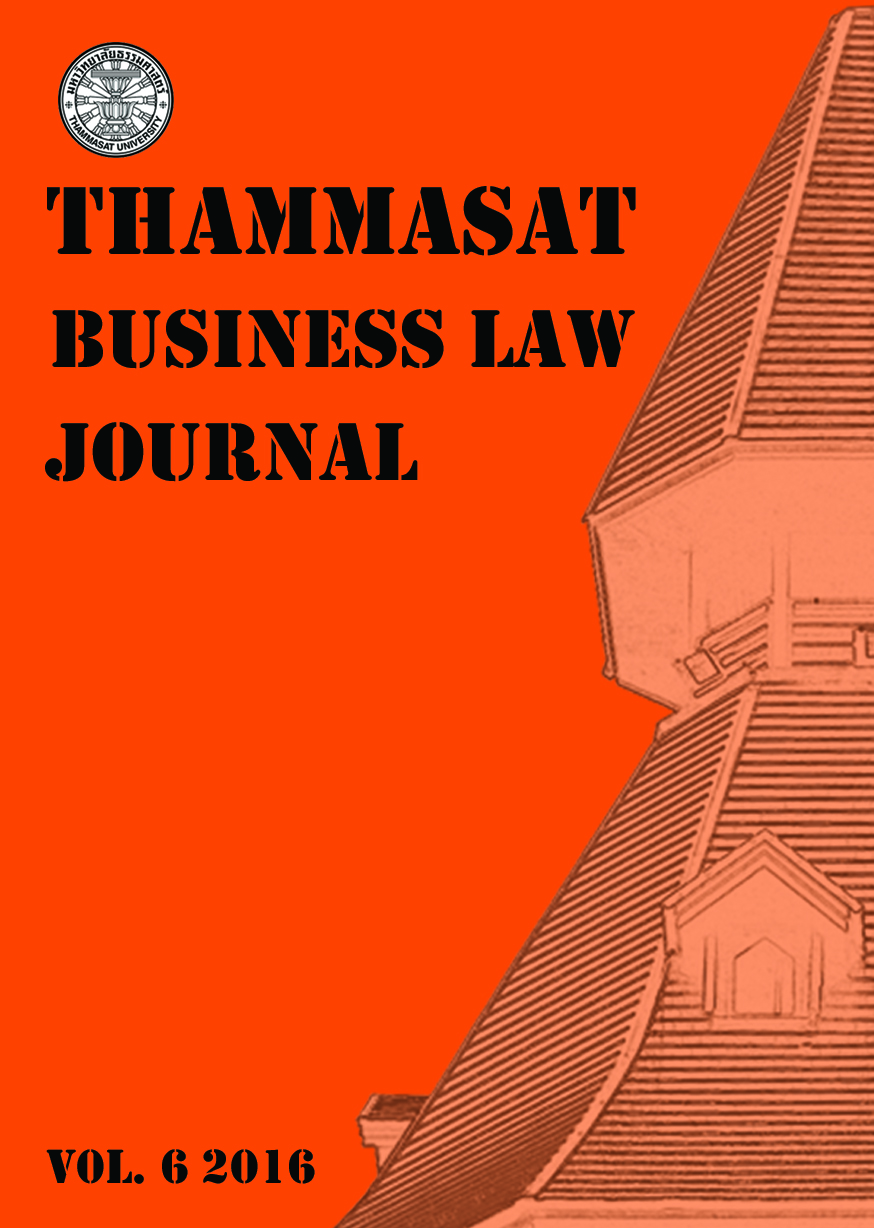FORMAL REQUIREMENTS FOR INTERNATIONAL COMMERCIAL CONTRACTS: COMPARATIVE STUDY BETWEEN THAI AND FOREIGN LAWS
Main Article Content
Abstract
At present, it is important that business transactions conform with formal requirements as to writing or written evidence as required by laws appropriate to certain contracts. Such requirements aim to protect the contracting parties from fraudulent actions and to ensure peace in business relations. Despite their significances, formal written requirements appear to be losing importance for international transactions when modern convenient means of communication are used to conclude contracts in trade. Under the “Freedom from Forms Requirements” concept, no formalities are required for international commercial transactions. Any type of evidence is allowed to demonstrate the existence or content of the contract.
However, in the Thai context, problems exist in terms of formal requirements for contracts for international sale of goods. Paragraph 3 of Section 456 of the Thai Civil and Commercial Code (CCC) is commonly used by the courts to determine trade disputes. For enforcement of the law, written evidence signed by the contracting parties is required. This provision obviously does not offer a satisfactory remedy or enable enforcement for injured parties who lack documentary evidence. The study of the United Nations Convention on Contracts for the International Sale of Goods (the “CISG”), the uniform law for international sale of goods contracts, shows that Article 11 of this international instrument requires no formalities for conclusion of a contract. Moreover, other international instruments, such as the Principles of European Contracts Law and UNIDROIT Principles of International Commercial Contracts 2010, incorporate similar concepts as the CISG. They declare that commercial contracts can be formed without formalities unlike Section 456 Paragraph 3 of the CCC.
Since Thailand has retained formal requirements for conclusion or enforceability of contracts of sale including contracts for international sale of goods, the solution to this problem is to amend Paragraph 3 of Section 456 of the CCC by adding a new paragraph for application particularly to contracts for international sale of goods. This new paragraph should specify that the formal requirement embodied in Paragraph 3 shall not be applicable to international sale of goods contacts. In addition, for the long-term development of international trade in Thailand, ratifying the CISG would be advantageous in making Thai international trade more acceptable from foreign trade partners’ perspective.
Article Details
References
3rd ed. Oxford: University Press, 2005.
Bridge FBA, M. G. The Sale of Goods. 3rd ed. Oxford: University Press, 2014.
Farnsworth, E. Allan. Contracts. 7th ed. Canada: Little, Brown & Company Limited, 1982.
Linton Corbin, Arthur. Corbin on Contracts, One Volume Edition. St
Paul, Minn.: West Publishing Co., 1952.
Schlechtriem, Peter & Petra Butler. UN Law on International Sales,
The UN Convention on the International Sale of Goods.
Berlin: Springer-Verlag Berlin Heidelberg, 2009.
Schwenzer, Ingeborg, Hachem Pascal, & Christopher Lee. Global
Sales and Contract Law. Oxford: University Press, 2012.
วิษณุ เครืองาม. คำอธิบายประมวลกฎหมายแพ่งและพาณิชย์ ซื้อขาย, แลกเปลี่ยน, ให้. พิมพ์ครั้งที่ 10.
กรุงเทพฯ: นิติ บรรณาการ, 2549 (Wissanu Krea-Ngam. Textbook on Sale, Exchange and Gift. 10th ed. Bangkok: Nitibannakarn, 2006).
Dimatteo, Larry A. “An International Contract Law Formula: The
Informality of International Business Transaction Plus the
Internationalization of Contract Law Equals Unexpected Contractual Liability.” Syracuse Journal of International Law and
Commerce, no. 23 (1997).
Hofmann, Nathalie. “Interpretation Rules and Good Faith as
Obstacles to the UK’s Ratification of the CISG and to the Harmonization of Contract Law in Europe.” Pace International Law
Review, no. 22 (2010): 145-181.
Pieck, Manfred. “A Study of the Significant Aspects of German
Contract Law.” Annual Survey of International Law & Comparative Law, no. 3 (1996): 111-176.
Schlechtriem, Peter. “Uniform Sales Law - The Experience with
Uniform Sales Laws in the Federal Republic of Germany.”
JuridiskTidskrift, (1991-1992): 1-28
Salin Thewphaingam. “The Unification of International Sale Law:
Uniform Interpretation of the United Nations Convention on
Contracts for the International Sale of Goods (CISG).” Master’s Thesis. Faculty of law Thammasat University, 2012.
Azzouni, Ahmad. “The Adoption of the 1980 Convention on the
International Sale of Goods by the United Kingdom.”
http://www.cisg.law.pace.edu/cisg/biblio/azzouni.
html#iia (accessed May 5, 2016).
CISG Database. “CISG: Table of Contracting States.”
http://www.cisg.law.pace.edu/cisg/
countries/cntries.html (accessed May 21, 2016).
UNCITRAL. “UNCITRAL Digest of Case Law on the United
Nations Convention on the International Sale of Goods
(2012).” http://www.uncitral.org/uncitral/en/case_law/
digests.html (accessed June 5, 2015).


